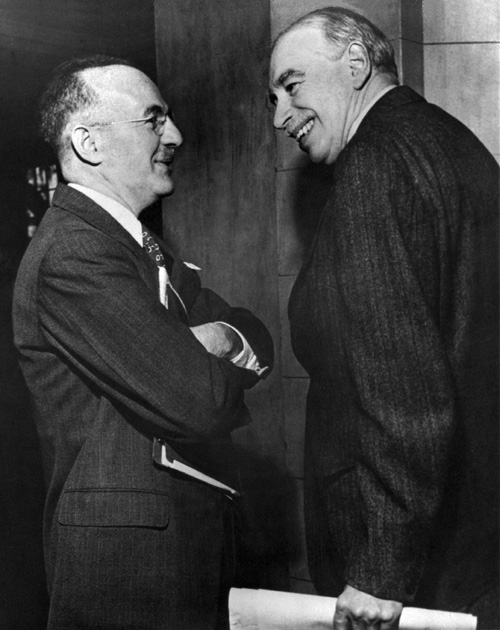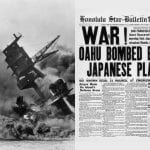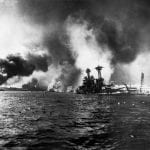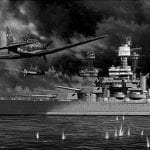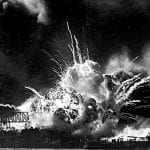The following article on the story of Pearl Harbor is an excerpt from John Koster’s Operation Snow: How a Soviet Mole in FDR’s White House Triggered Pearl Harbor. Using recently declassified evidence from U.S. archives and newly translated sources from Japan and Russia, it presents new theories on the causes of the Pearl Harbor attack. It is available to order now at Amazon or Barnes & Noble.
Vitalii Pavlov groped through his pocket and finally came up with two quarters and a dime. He was nervous. At twenty-seven, Pavlov was the second in command of Soviet espionage operations for the NKVD in the United States, following a purge in which Josef Stalin had murdered many of the senior agents. Successor to the Cheka and predecessor of the KGB, which replaced it in 1946, the NKVD was a murderous agency with its own foreign policy. Pavlov had arrived in the United States a month earlier, in April 1941, and was still fumbling through a new world of cultural confusion. Blond, handsome, self-conscious about his shaky command of English, and in over his head in the lethal world of espionage, Pavlov was on a mission of importance far beyond his years or experience.
Pavlov slid into a phone booth in Washington, D.C., and shut the door. He inserted the coins into the unfamiliar telephone, heard the clink and jangle, and dialed. The phone started to ring. He said later that he felt time had stopped. Someone picked up at the other end.
“White here,” the voice said.
“Mr. White, I’m a friend of your old friend Bill,” Pavlov said. “Bill is in the Far East and wants to meet with you when he comes back. He wants you to meet with me right now.”
The Story of Pearl Harbor: Spy Masterminds
Harry Dexter White was the director of the Division of Monetary Research of the U.S. Treasury Department. “Bill” was Iskhak Abdulovich Akhmerov, a Russified Tatar NKVD agent posing as an expert on China whom White had met two years earlier on the recommendation of Joseph Katz, yet another NKVD agent and active “first line” spy recruiter. Katz was coowner of a New York City glove manufacturing company which operated as a cover. Akhmerov, a Bolshevik since his teens in 1919, with dark hair, narrow eyes, and a square classic profile, was handsome in a Hollywood tough-guy way that women found fascinating. Katz, who wore alarmingly thick eyeglasses, full dentures, and walked with a limp, spoke German, Lithuanian, Russian, and Yiddish. He was a superb middleman in the world of espionage because he looked nothing like a spy.
“I have a pretty busy schedule,” White said nervously. Pavlov was ready for this. NKVD sources had described White as a dedicated communist sympathizer and a source of information since the mid-1930s, but also as timid and rather cowardly.
“I’m only going to be in Washington for a few days, and it’s important to Bill that you meet with me,” Pavlov said. “If you can give me half an hour at Old Ebbitt Grill, I’ll pay for the lunch.” “How will I know who you are?” White asked.
“I’ll try to get to restaurant a few minutes before you do,” Pavlov said, sensing agreement. “I’m of average height, blond hair, and I’ll be carrying a copy of New Yorker and leave it on table.” “All right,” White said reluctantly.
Pavlov had breakfast the next day with his handler, an NKVD agent known as Michael, and went over the details as they rode to the Old Ebbitt Grill in a Soviet embassy limousine. Michael reminded him that White was a senior official of the United States government and that Pavlov should not make any offer that included outright treason, for fear of entrapment and the notoriety that entrapment might bring. Michael reminded Pavlov that he was protected by a diplomatic courier’s passport, and even if White refused to help and turned him in to the FBI, Pavlov himself would be safe—though with the tacit understanding that Comrade Stalin did not like people to fail.
Michael probably knew, even if Pavlov did not, that Rudolf Hess, Hitler’s most devoted follower and the top Nazi fluent in English, had flown to a meeting with British aristocrats on May 10 to make an astounding offer. Britain, then apparently losing the war with the Hitler-Stalin alliance, could have peace with Germany if Britain agreed to stay neutral in the coming clash between Germany and Russia. Hitler offered to evacuate France, Belgium, the Netherlands, Norway, and Denmark, keeping only German- speaking Luxembourg and Alsace-Lorraine, if Winston Churchill stepped down as prime minister and Britain gave Germany a free hand in Eastern Europe. The control of Russian farmland and resources had obsessed Hitler since he and Hess hammered out Mein Kampf in 1923–1924. Churchill would not step down. The British did not trust Hitler, and they, like the Germans, wrote off Rudolf Hess as a self-promoting lunatic. But the NKVD knew that Britain’s consideration of Hess’s proposed alliance could not be ignored. It comported with Britain’s traditional hostility to Russia and its more recent fear of communism.
“Comrade Akhmerov’s ideas are all compatible with the national security of the United States,” Michael told Pavlov. “White is already anti-fascist, so make sure to emphasize that these ideas are dictated by the need to counteract German fascism and Japanese militarism. . . . Tell him that we anticipate a Hitlerite attack on our country, and, by protecting us from the aggression of Japan in the Far East, he will assist in strengthening the Soviet Union in Europe. Anything that helps bridle Japanese expansion in China, Manchuria, or Indochina would be equally useful to us and to the American interests in the Pacific region. If you need to, remember to mention the Tanaka Memorial.”
The Tanaka Memorial, supposedly Japan’s scheme for a world takeover, was a Soviet forgery that dated back to 1931. The Russian forgers claimed it was a memorandum from Gi’ichi Tanaka, a soldier in the Russo-Japanese War and the Japanese prime minister in 1927, just after Emperor Hirohito’s ascension to the throne. The Tanaka Memorial detailed the need to conquer first China, then Russia, then Western Europe, and finally North and South America. When renegade Japanese communists translated the Tanaka Memorial from its original Russian, its expressions were so foreign to Japanese thought and idiom that it was instantly recognized as a fake.
Michael had just described to Pavlov what Soviet intelligence had code-named “Operation Snow.” For the Soviet Union to be able to fend off a German attack from the west, the Japanese threat from the east would have to be neutralized. A war between Japan and the United States would achieve that goal nicely. Pavlov’s job was to find a friend in the U.S. government with enough influence over American policy to subtly but effectively provoke that war.
Pavlov was calm when he arrived at the Old Ebbitt Grill to meet White and found an empty table. He set out his copy of the New Yorker and noticed with satisfaction that he was the only blond customer in the dining room. A few moments later, Harry Dexter White walked in. Pavlov recognized him from Akhmerov’s description—energetic if slightly pudgy, with a small dark moustache and metal-frame glasses. Pavlov took him to be between thirty-five and forty years old, though White in fact was almost fifty. His childlike timidity made him look younger than he was.
Pavlov stood up. “Mr. White.”
“Mr. Pavlov,” White replied as he walked over. Pavlov noticed that White had mild, sad eyes. As they were shaking hands, the waiter walked up.
“May I take your order?”
“You can just order breakfast for me,” Pavlov said. White spoke to the waiter and then turned back to Pavlov.
“I must apologize for my barbarous English,” Pavlov said. “I’ve been living in China long time, far from civilization.”
“I don’t believe that will prevent us from getting to know one another,” White said gently. (This was an ironic remark. White had tried to teach himself Russian—with little success—so he understood Pavlov’s problem. In Chinese and Japanese, as in Russian, there are no definite and indefinite articles, and people who translate their thoughts literally into English tend to sound rather primitive even if the thoughts themselves are elegant or profound.)
“Bill sends you his regards,” Pavlov said. “He’s friend of mine, but he’s actually more like an instructor, whom I deeply respect— you understand?”
White nodded with approval.
“Bill has told me little bit about you,” Pavlov said. “He asked me for a favor which I willingly granted. He emphasized that I should try to be very genuine and that it was impossible to postpone the message until he returns home and can meet you.” “When is Bill coming to the USA?” White asked.
“Bill wants to come back as soon as possible, no later than end of this year,” Pavlov said. “He is trying to figure out the American and Japanese attitudes. The expansion of Japan into Asia has him constantly alert. This is why he asked me to meet you, only if you didn’t object, to get acquainted with the idea that he’s most involved with right now.”
Pavlov was lying. Akhmerov was not in China—he was in Moscow under detention. Akhmerov had broken protocol by romancing and marrying an American communist, Helen Lowry, a niece of Earl Browder, the highly visible leader of the Communist Party of the United States. Stalin’s paranoid binge of executing his own followers had brought Akhmerov back to Moscow to answer charges, and he had been spared execution but put on hold. Akhmerov was eagerly awaiting the results of the dialogue between White and Pavlov.
“I had a good impression of Bill when I met him a couple of years ago,” White said. “He’s obviously a very wise person. I’ll be glad to listen to you.”
“I must apologize again for my lack of English knowledge,” Pavlov said with a smile. He dipped into his breast pocket and put a small, folded note on the table in front of White, next to the New Yorker. White unfolded the note and read it carefully. His eyes betrayed astonishment and apprehension, but his mouth and breathing were under tight control as he read an outline of Operation Snow.
“I’m amazed at the concurrence of my own ideas with what Bill thinks, according to this,” White gasped, to explain his visible response. His pudgy face was pale. White tried to tuck the note into his own breast pocket, but when Pavlov stuck his hand out for it he tamely gave it back.
“I’m going to China in couple of days, and Bill wishes to know your opinion,” Pavlov said. “In fact, he is so worried whether he is going to see a management of the USA of the Japanese threat, and whether something will be done to bridle the Asian aggressor.”
“You can tell Bill this from me,” White said nervously. “I’m very grateful for the ideas that corresponded to my own about that specific region. . . . I’ve already started to think about what is possible and what is necessary to undertake . . . and I believe with the support of a well-informed expert, I can undertake necessary efforts in the necessary direction. . . . Did you understand everything I just said?”
“You are very grateful of ideas that correspond with your own about that specific region. . . . You have already started to think about what is possible and what is necessary to undertake . . . and you believe with the help of well-informed expert, you can undertake necessary efforts in necessary direction.”
White nodded with satisfaction. “Karasho,” he said in Russian with an American accent. “Your memorization is very good. . . . Let me pay for lunch. . . . I ordered it.”
The Story of Pearl Harbor: Soviet Espionage
When Vitalii Pavlov walked out of the Old Ebbitt Grill, he was a “made man” in Soviet intelligence. He survived subsequent paranoid purges as Stalin slipped into senescence, and he later retired as a lieutenant general of the KGB. Akhmerov, the mastermind behind the plot, was restored to Stalin’s good graces and was back in the United States by September, in charge of the most successful NKVD spy operation in history. Akhmerov would remain head of the Soviet espionage program in the United States until 1948. Katz fell from favor when he admitted he was not man enough to kill Elizabeth Bentley, “The Red Spy Queen,” after her defection. Bentley had always said she found the gentle little cripple likable, so sentiment may also have been involved. Katz was shuffled back to Europe. Harry Dexter White, a trusted assistant to Franklin Delano Roosevelt’s close friend and secretary of the Treasury, Henry Morgenthau Jr., had just bought Vitalii Pavlov lunch. White had also accepted a written NKVD order on behalf of Josef Stalin to protect the Soviet Union’s Pacific flank. He had agreed to provoke a war between the United States and Japan.
This article on the story of Pearl Harbor is part of our larger selection of posts about the Pearl Harbor attack. To learn more, click here for our comprehensive guide to Pearl Harbor.
 |
 |
This article on the story of Pearl Harbor is from the book Operation Snow: How a Soviet Mole in FDR’s White House Triggered Pearl Harbor © 2012 by John Koster. Please use this data for any reference citations. To order this book, please visit its online sales page at Amazon or Barnes & Noble.
You can also buy the book by clicking on the buttons to the left.
Cite This Article
"The Story of Pearl Harbor: The Meeting of the Spy Masterminds Who Triggered the Event" History on the Net© 2000-2024, Salem Media.
July 27, 2024 <https://www.historyonthenet.com/the-story-of-pearl-harbor>
More Citation Information.



